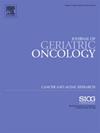术前运动对低体能老年人结直肠癌手术后并发症的影响:CANOPTIPHYS随机对照试验
IF 3
3区 医学
Q3 GERIATRICS & GERONTOLOGY
引用次数: 0
摘要
术前锻炼可降低腹部肿瘤大手术后并发症的风险,但可用于此类干预的时间有限。我们的目的是评估短期术前锻炼计划对计划接受结直肠癌手术的低体能老年患者术后预后的影响。材料和方法这是一项随机对照、多中心试验,考虑纳入年龄≥65岁且最大步行速度较低的结直肠癌手术患者。干预在参与者的家庭环境中进行,包括手术前两到三周的吸气肌训练、有氧训练和力量训练。运动强度高,频率高,至少六次由物理治疗师监督。此外,参与者被要求进行无监督的锻炼,目标是每天进行两次吸气肌训练,每周进行五到六次有氧和力量锻炼。对照组术前不做运动。主要终点是术后30天内任何并发症的发生。次要结局为术后住院时间和出院目的地。采用二元logistic回归和Mann-Whitney U检验对结果进行分析。结果51例患者被纳入意向治疗分析,分为术前运动组(27例)和常规护理组(24例)。干预组至少有一种术后并发症的比例为48.1%,对照组为62.5%。术前运动对发生术后并发症的几率没有影响(OR: 0.56, 95% CI: 0.18-1.71),也没有影响出院到其他护理机构而不是回家(OR: 0.98, 95% CI: 0.29-3.27)。干预组住院时间中位数为5 (IQR: 4-6),对照组为5.5 (IQR: 4-7.8) (p = 0.55)。在这项对等待大肠癌手术的低体能老年患者的研究中,我们无法证明术前运动对术后并发症、出院目的地或住院时间的影响。由于样本量小,这些结果应谨慎解释。本文章由计算机程序翻译,如有差异,请以英文原文为准。
Effect of preoperative exercise on postoperative complications after colorectal cancer surgery in older people with low physical fitness: The CANOPTIPHYS randomised controlled trial
Introduction
Preoperative exercise may decrease the risk of complications after major abdominal cancer surgery but the amount of time available for such interventions is limited. Our objective was to evaluate the effect of a short-term preoperative exercise program on postoperative outcomes in older patients with low physical fitness scheduled to undergo colorectal cancer surgery.
Materials and Methods
This was a randomised controlled, multicentre trial where patients scheduled for colorectal cancer surgery were considered for inclusion if they were ≥ 65 years of age and had low maximal walking speed. The intervention took place in participants' home environments and included inspiratory muscle training, aerobic training, and strength exercises for two to three weeks before surgery. Exercise was of high intensity and frequency, with at least six sessions supervised by a physiotherapist. Additionally, participants were instructed to perform unsupervised exercises, aiming for a total frequency of inspiratory muscle training twice daily, and aerobic and strength exercises five to six times per week. A control group underwent surgery without preoperative exercise. The primary endpoint was occurrence of any complications within 30 days after surgery. Secondary outcomes were postoperative length of hospital stay and discharge destination. Binary logistic regression and Mann-Whitney U test were used to analyse outcomes.
Results
A total of 51 patients were included in the intention-to-treat analysis and allocated to preoperative exercise (n = 27) or usual care (n = 24). The proportion of participants with at least one postoperative complication was 48.1 % in the intervention group and 62.5 % in the control group. There was no effect of preoperative exercise on the odds of developing postoperative complications (OR: 0.56, 95 % CI: 0.18–1.71) nor on discharge to another care facility instead of home (OR: 0.98, 95 % CI: 0.29–3.27). The median length of stay in nights was 5 (IQR: 4–6) for the intervention group and 5.5 (IQR: 4–7.8) for the control group (p = 0.55).
Discussion
In this study of older patients with low physical fitness awaiting colorectal cancer surgery, we could not demonstrate an influence of preoperative exercise on postoperative complications, discharge destination or length of hospital stay. These results should be interpreted with caution due to a small sample size.
求助全文
通过发布文献求助,成功后即可免费获取论文全文。
去求助
来源期刊

Journal of geriatric oncology
ONCOLOGY-GERIATRICS & GERONTOLOGY
CiteScore
5.30
自引率
10.00%
发文量
379
审稿时长
80 days
期刊介绍:
The Journal of Geriatric Oncology is an international, multidisciplinary journal which is focused on advancing research in the treatment and survivorship issues of older adults with cancer, as well as literature relevant to education and policy development in geriatric oncology.
The journal welcomes the submission of manuscripts in the following categories:
• Original research articles
• Review articles
• Clinical trials
• Education and training articles
• Short communications
• Perspectives
• Meeting reports
• Letters to the Editor.
 求助内容:
求助内容: 应助结果提醒方式:
应助结果提醒方式:


